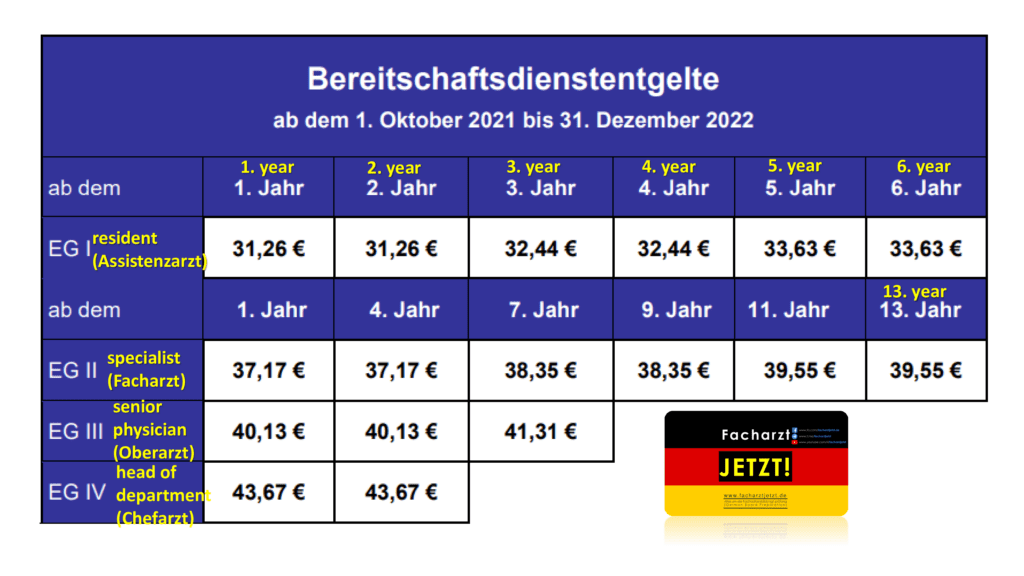
• Tell me where you work & your specialty & I will tell you your income
The working place and the specialty decide the salaries of doctors in Germany. In this article, we explain the salaries of doctors in Germany when they work in hospitals.
We explained other possible working places and the amount of money they could generate for the different specialties in the following article:
• A German recruiting expert can help doctors with Approbation get a job for free. Click JETZT: here.
• If you have any doubts or need more clarification, feel free to ask any time in the main group of Facharzt JETZT on Facebook and Telegram (all Telegram groups will be added as a folder).
• This article is a guide to enhance your understanding of the topic; however, it should not be your sole resource. Always consult official websites for the most accurate and up-to-date information (you can read our full disclaimer here).

• Salary agreements (der Gehaltstarif)
Most German hospitals* pay their doctors using unified salary tables called salary agreements (🇩🇪 der Gehaltstarif), which are published by the largest union of doctors in Germany (🇩🇪 Marburger Bund – MB).
*There are few exceptions
• Some private and Christian hospitals have their salary agreements. But their salaries are either the same or 5-10% more or less compared to the Marburger Bund (MB) salaries.
• Doctors working in university hospitals usually get around 5-8% more salary (the exact numbers are here), but for that, doctors in university hospitals need to:
– Work 42 hours instead of 40 hours a week (this means, 8 hours extra per month). So basically, if you worked in non-university hospitals these extra hours, you will almost get the same salary.
– The working conditions are usually hard in university hospitals and one is expected to work extra hours and these hours will not be paid or given to you as free time in the future (🇩🇪 der Freizeitausgleich)

• Understanding gross and net salary
Firstly, before understanding the salaries of doctors in Germany, there are two terms to understand:
Gross salary (🇩🇪 Brutto) and net salary (🇩🇪 Netto)
In Germany, the salary mentioned in your job contract or in job ads is called the gross salary. For example, if your salary in the job contract is 5000 euros, this does not mean that you are going to get 5000 euros transferred to your bank account at the end of the month. Instead, you are going to get a percent of it, after taxes and insurances were automatically deducted from that. The money that is transferred to your bank account is called the net salary. In other words, the net salary is the money you get transferred to your bank account at the end of the month.
The net salary that remains from the gross salary depends on your marital status:
| Single | Married | |
|---|---|---|
| Net salary is around: (as percent of the gross salary) | 59% | 65% |
More details about net and gross salary are in the following article:
🇩🇪 Gross salary (🇩🇪 das Brutto) vs net salary (🇩🇪 das Netto)



• In hospitals: Factors that influence the salaries of doctors in Germany
Two factors determine the salary in the salary agreements:
(1) Hierarchy level (if resident, specialist, senior physician, etc.)
(2) Years of experience
For example, if you are a resident in the second year, you get a higher salary than a resident in the first year. A specialist will in his turn get more money than the residents. See the next tables for exact numbers.
• In hospitals: Approximate salaries of doctors in Germany
The numbers in Table (1) are in euros.
| Hierarchy level (🇩🇪 Entgeltgruppe) | Gross salary (euros) | Net salary single (euros) | Net salary married & spouse not working (euros) | Net salary married & spouse working (euros) |
|---|---|---|---|---|
| Resident (🇩🇪 Assistenzarzt) | 5084 | 3091 | 3509 | 3091 |
| Specialist (🇩🇪 Facharzt) | 6711 | 3923 | 4506 | 3923 |
| Senior physician (🇩🇪 Oberarzt) | 8406 | 4721 | 5558 | 4721 |
| Consultant (🇩🇪 Leitender Oberarzt) | More than a senior physician | |||
| Chief physician/Head of department (🇩🇪 Chefarzt) | 9888-End is open but generally around 12-30 thousand | At least 5450 | 6478 | 5450 |
The above-mentioned salaries of doctors in Germany are for:
– Working hours: 40 hours/week
– Vacations included: Around 30 +/- 2 days vacations per year (>6 weeks)
– Public holidays: Around 10-14 (depending on where you work in which German state)
N. B. What you work extra (the shifts) will be paid per hour (this will be explained in Table number 2)
• Real-life numbers from a salary table of the Marburger Bund (MB)

Source: Website of the Marburger Bund (MB), Link
• Sources of extra income:
In hospitals, many factors increase the salaries of doctors in Germany. Other factors outside the hospital could also generate an extra income for doctors in Germany. We will explore them in detail.
– Extra shifts
• Money paid per hour for extra shifts


• Factors that add more money to the hourly rates
| Factor | Extra money |
|---|---|
| Working at night from 9 PM to 6 AM | ca. 8 euros per hour |
| Working on Sundays | ca. 8 euros per hour |
| Working on Saturdays after 11 PM | ca. 3 euros per hour |
| Working on holidays (ca. 10-14 days per year) | 130% more (e. g. 69 euros instead of 30 euros per hour) |
| Changing shifts to and from a group of night shifts after one another | ca. 150 euros extra for all of these shifts as a bonus |
| Taking a shift suddenly instead of colleagues who are ill or cannot do the shift for whatever reason | Some hospitals pay double the hourly rates (plus a lot of thanks and hugs 🫂💘🤣) |
33.63 euros per hour (see table 1, last column, second row) + ca. 8 euros extra for the night work = Total money of 41.63 euros per hour = 41.63*9 hours = 374,67 euros Brutto.
N. B. Usually, the night shifts are from 7 or 8 pm until 7 or 8 am on the next. So, you will be working around 12 hours.
So, if you work an extra 50 hours per month, you get 1000-1800 euros as a net salary extra to your main salary. Many doctors in Germany nowadays want a work-life balance. So, if you like to work more, many will even thank you for taking their shifts (sometimes even pay you to do it for them!).
Related article: 🇩🇪 Doctors in Germany: Work-life balance
– Paid vacations (der bezahlte Urlaub)
Doctors have in Germany around 30 paid vacations per year (>6 weeks). Paid means that for every day you are on holiday, you get around 80-400 euros (depending on your position, number of years of experience, and how many night shifts you did in the last three months).
– Paid sick leaves (die Krankschreibung)
When doctors are sick and do not work, they are paid for these days. So, you are not only not working but also being extra paid for not being able to work 😅 Doctors have the right to have around 30 days per year as a sick leave. Extra days could be granted when the children are sick (so that the parents could take care of them).
– Child allowance (das Kindergeld)
You get per child 250 euros extra as net salary.
– Parental leave (die Elternzeit)
If a woman gets a child, she has the right for up to two years not to work and she would get 60% of her salary. If you are a male doctor and your wife is originally not working (housewife), then you can get a paid leave for up to 1 year (also, you would get 60% of your salary). Of course, you do not need to pay for health insurance or pension funds during this period. If both the man and woman are working, then both of them can apply for parental leave (but not at the same time).
– Maternity protection (die Mutterschutz)
If a female doctor gets pregnant, then from the moment of pregnancy she is not allowed to work in some specialties (like pediatrics; the danger of infection). Therefore, she would be asked to remain at home and of course, get 60% of her salary. Moreover, if a pregnancy was endangered (difficult pregnancy, high risk of abortion), a woman is not allowed to work and would get 60% of her salary.
– Assessment (die Begutachtung)
In certain specialties, particularly psychiatry, you could do assessments for the courts or the pension funds. For example, you assess if someone has advanced dementia and needs to be placed in an old people’s home or if someone is psychologically fit enough to own a gun. In Neurology, for example, you could assess the disability level after a work injury.
– Examination for the police in the emergency departments
If someone is driving under the influence (e. g. Alcohol or drugs), the police can bring him to the emergency department to withdraw blood and do a physical examination. It lasts about 12-20 minutes. You will get around 30-120 euros per patient (depending on time, and what you exactly did in the examination). Normally, the internal medicine residents are responsible for such a task. Doctors from other specialties could do it too (of course, if the internal medicine resident did not already do that before the patient even entered the emergency department 😂… joking!).
– Unemployment benefit (das Arbeitslosengeld)
If someone worked for more than one year and lost his job or his job contract ended, then he will get das Arbeitslosengeld in the form of 60% of his monthly salary. The money for health insurance and retirement funds will be paid too. Moreover, you will get money for transportation during interviews for new job positions. No one will be running after you to find a job. So, take your time. You can get this money for up to a year.
– Working as a locum doctor (der Leiharzt/Honorararzt)
A locum doctor is a doctor (usually a specialist or an experienced resident doctor) who works on a short-term basis in a hospital to cover an acute shortage of doctors in that hospital. For example, if two female doctors got pregnant and two resigned, then there are not enough doctors to do the shifts. In this case, a locum doctor or many would be hired. They are paid between 80 and 140 euros an hour. They could be hired only for one night or for months until the shortage of doctors in the department is solved.
By the way, the term “locum” is derived from the Latin phrase “locum tenens,” which means “to hold a place.”

– Working as an emergency doctor (🇩🇪 der Notarzt/die Notärztin)
If you did a special course and after having a certain number of years of experience in Germany (1-2 years), you can do a little exam (Zusatzbezeichnung für die Notfallmedizin). Then you will be able to work as an Emergency doctor in the emergency services. The money paid is around 30-50 euros per hour. In some cities, you will be paid an extra 25-40 euros for each deployment (🇩🇪 der Einsatz). In Dortmund, for example, the emergency did around 10-20 deployments per 24 hours.
– Tax declaration (eine Steuererklärung)
You can get between 1 and 8 thousand euros back. This requires a lot of explanation. We explained it in a separate article: link.
• Germany vs USA
Let’s compare the salaries of doctors in Germany and the USA. They might be in Germany a bit higher in the residency period by about 1000-1500 euros (net salary) (because German residents get paid for the shifts they do). But starting from the specialist level and above, the wages in the USA are certainly at least 2.5 times higher than in Germany. There are, of course, some exceptions in Germany for some specialties (e., g. Radiology). We explained more differences between the two countries in the following detailed article:
• General Notes:
– Negotiating the salary
The salaries of residents are almost always fixed. You cannot negotiate that. But starting from the specialist level, one could negotiate his salary, but not in all hospitals and specialties. If you are for example a a specialist in dermatology and you agree to work in a hospital in a very small German city, then you have a greater chance of getting more salary than the regular salaries of the salaries agreements mentioned above. But do not be too optimistic. They are not as high as in the USA.
– Does the nationality play a role in the salary? No!
The nationality does not play a role in the salary. A German and a non-German doctor getting the same gross salary, having the same marital status and having a similar insurance company, would get the same net salary. However, after residency, German doctors tend to get promoted quickly and get more salaries than those mentioned in the salary agreements. But this is not because they are German. If you could learn good German, have a similar medical level to your German colleagues, and understand the culture well and hence increase the satisfaction of patients & co-workers, then you get the same salary and even more.
– Quicker being promoted & hence getting higher salaries
It is in most hospitals easy to get promoted to a senior physician ( ein Oberarzt/eine Oberärztin). Some residents in the last year of residency do reach this salary level. They are then called in Germany “ein Funktiosnoberarzt/eine Funktionsoberärztin”. The word might be translated to something like: in the function of a senior physician. This is because they do the job of senior physicians 😍🥳, but still do not have the German Board (
ein Oberarzt/eine Oberärztin). Some residents in the last year of residency do reach this salary level. They are then called in Germany “ein Funktiosnoberarzt/eine Funktionsoberärztin”. The word might be translated to something like: in the function of a senior physician. This is because they do the job of senior physicians 😍🥳, but still do not have the German Board ( eine Facharztanerkennung).
eine Facharztanerkennung).
– Yearly increases in the salaries
In hospitals, doctors’ salaries in Germany increase approximately 1-2,5 percent every 2 years.
– Salary with Berufserlaubnis vs Approbation (temporary vs permanent medical license)
In at least 90% of hospitals (except in the state of Baden-Württemberg), doctors with Approbation and Berufserlaubnis get the same basic salary (without the extra shifts). However, because in almost all hospitals, doctors with Berufserlaubnis are not allowed to do shift work, they cannot then generate extra money from the shifts.
To understand all the differences between the Berufserlaubnis & Approbation, you can read the following article:
🇩🇪 Approbation vs Berufserlaubnis: Can I work as a doctor with Berufserlaubnis? Yes, but…
– Income in clinics is for most doctors a lot more
Working in your clinic (🇩🇪 eine Praxis) generates more money. In the following article in our website, you can see official numbers about the average income of doctors owning their clinics: link.
Want to learn more? Questions?
Join JETZT (🇺🇸 now) all of our groups & ask what you like
(On mobile phone: The links are at the end of this page/ On PC: At the left side)
Further readings:
• “Salary structure for Doctors in Germany 2019 – 2020 – 2021”, Your2ndHeart blog by Tejas Ghetia, link.
Hi, what level is a registrar in the UK considered in Germany?someone PGY 8, with MRCP and working as. a registrar in UK? can someone join from UK as Honorar art?
Hi Ali, unfortunately, after Brexit, no recognition of British degrees in Germany, details here: https://facharztJETZT.de/brexit/